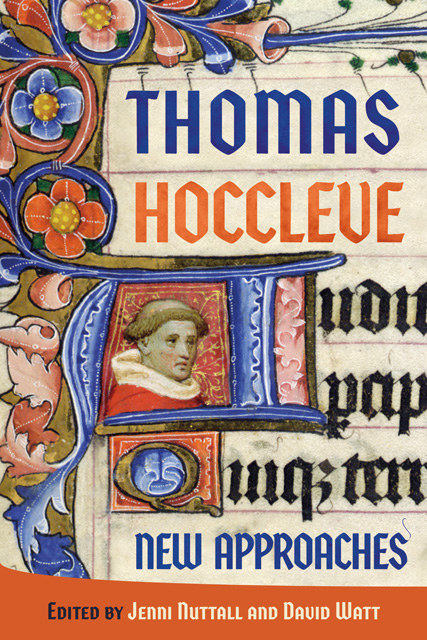Introduction: Hoccleve Then and Now
Published online by Cambridge University Press: 11 January 2023
Summary
In the scenes of day-to-day life which the government clerk Thomas Hoccleve presents in his poetry, he is often approached by other people. Often those whom he encounters know something of him in advance, whether from prior experience or hearsay. In the Male Regle, the innkeepers, cooks and taxi-boatmen recognise him as a generous customer who pays promptly and well (177–84, 195–8). The old man who walks alongside Hoccleve and introduces himself in the Regiment’s prologue has also heard of the poet and of his literary connection with Chaucer (who had died a decade earlier). When Hoccleve tells him his name, the old man responds with recognition: ‘Sone, I have herd or this men speke of thee’ (1866). Hoccleve is someone known to others and discussed in his absence. Even in the ‘Complaint’, when he describes how some in the Westminster crowd sought to avoid him, such bystanders nonetheless reveal that they both know who he is and some part of what has happened to him (C 43–5, 64–93, 120–35). Hoccleve’s reputation often precedes him, inviting many kinds of approaches even as it discourages others.
This collection of essays likewise approaches Hoccleve and his works, bringing both prior reputation and fresh eyes to bear on this most engaging of poets. Since an earlier collection of four essays on Hoccleve edited by Catherine Batt was published in 1996, Hoccleve’s star has continued to rise, and he is now among the most frequently taught of fifteenth-century authors as well as the subject of many journal articles and chapters, and a growing number of monographs. Many readers, not least the students who increasingly read Hoccleve’s verse as part of their university degrees, find him very accessible. Students often respond with enthusiastic recognition to the confessional elements of Hoccleve’s poetry, those passages in which he acknowledges his own failings and self-sabotage, his anxiety about the future, his frustrated career hopes or his precarious finances. Most particularly in an age where mental health difficulties are acknowledged more readily, many of us engage very directly not only with Hoccleve’s accounts of what it is to worry gloomily about the future but also his descriptions of a more acute mental health crisis and the social stigma which can result from such a temporary loss of sanity.
- Type
- Chapter
- Information
- Thomas Hoccleve New Approaches , pp. 1 - 22Publisher: Boydell & BrewerPrint publication year: 2022



